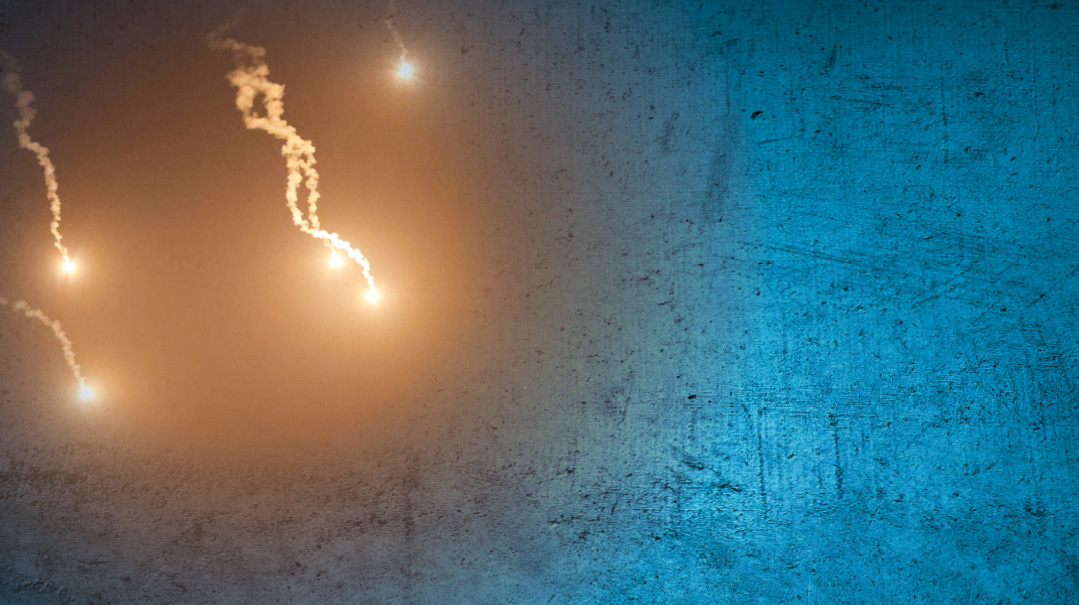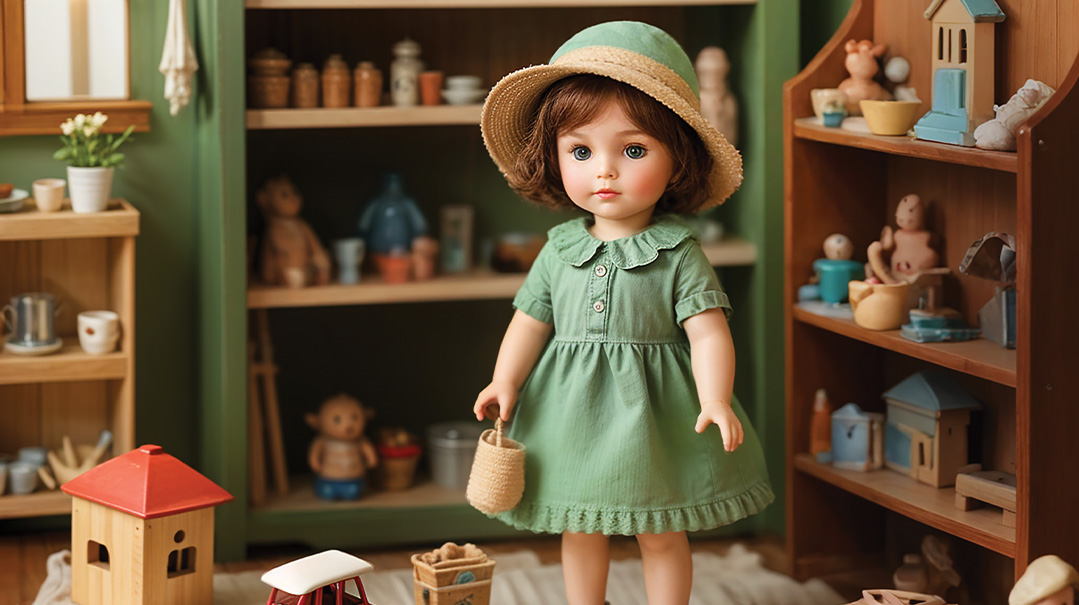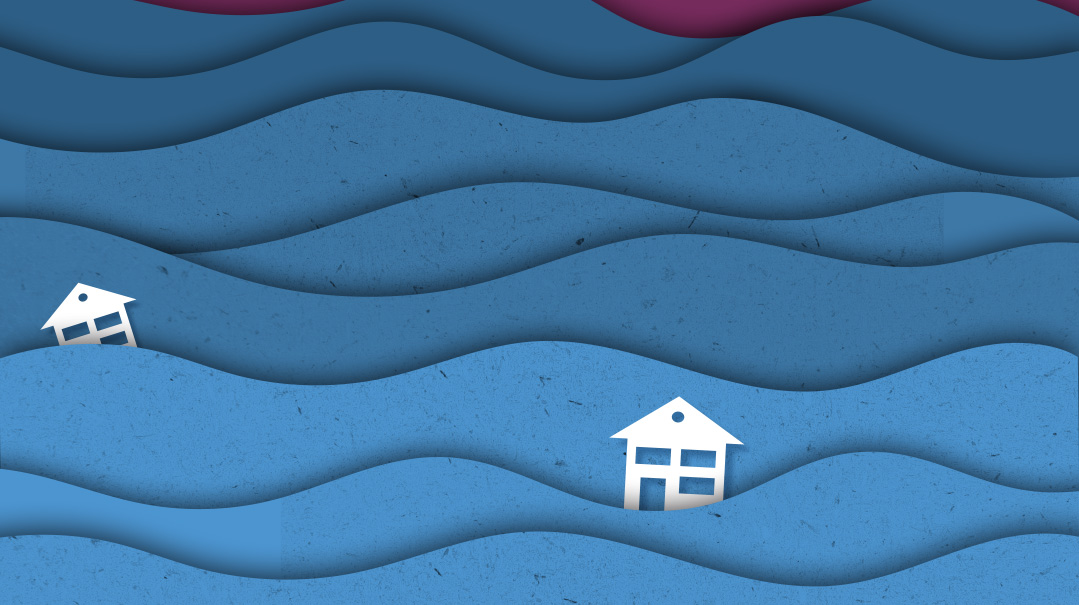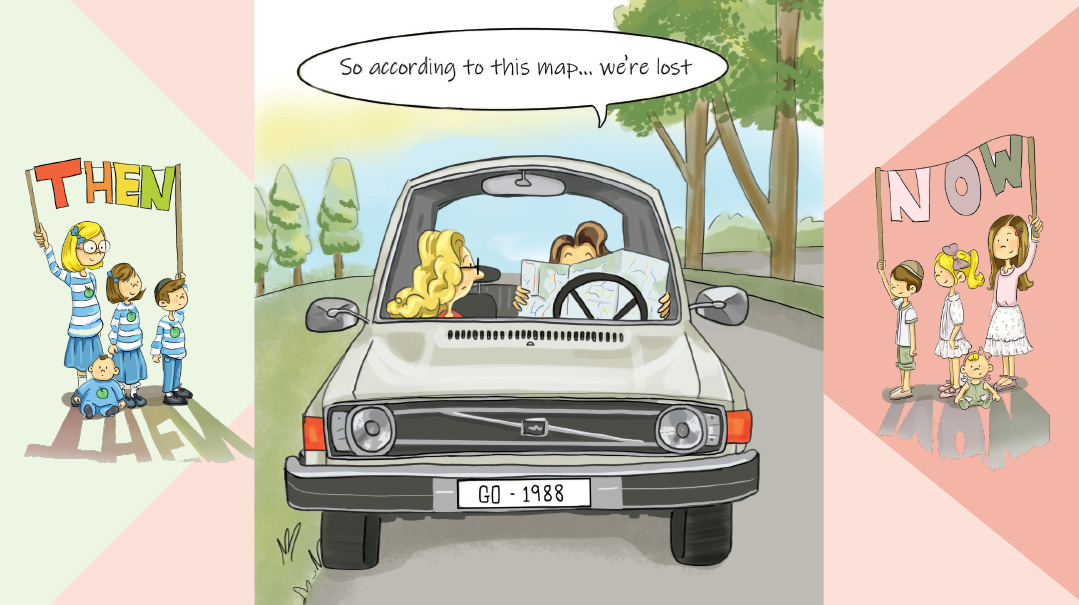Day of Shattered Song
| October 10, 20236 accounts of a Simchas Torah at war

Ashdod
Iron Swords, Domes, and Will
Rachel Newton
I
t’s 6:20 a.m., Shabbos morning, Simchas Torah, and I think I hear a boom in the distance.
Living in Ashdod, your thoughts go straight to Iron Dome. Is that…? Was that…?
My husband isn’t home. He’s at a neitz minyan for my nephew’s aufruf.
Another boom.
Yep. Something is going on….
Rise. Fall. Wailllll up and down together with my heart.
Off I go to drag the heavy metal frame across the window. I don’t believe the kids won’t have school tomorrow, curse those terrorists, what kind of day did they choose for slinging missiles at us?
Sad as it is, the inconvenience of it ruffles Ashdod residents’ equilibrium more than the actual danger. We’ve done this before.
Husband is definitely in a shul somewhere. That’s fine. He’ll find somewhere to go, along with whoever else is at the minyan.
We know sirens. We know where to run. We know where it’s safe.
The kids are asleep, the siren tapers away… and picks right up with another one. Up. Down. Kids stretching and mumbling drowsily, izzat a siren? Me shushing them, hoping they’ll go back to sleep.
What sleep?
Simchas Torah, we want to go to shul! To dance, to celebrate the culmination of a month of cleansing our hearts and souls, of drawing close to our Creator as we sit in the security of walls that wouldn’t withstand more than a breeze.
We don’t want to sit at home and wonder when the next siren is going to be (right now, actually), waiting in the ensuing silence for the impact (one, two).
I get dressed, because the aufruf, and how can I miss it? What will be with the dancing, the kiddush, the chassan, the kids. My thoughts go up and down like the sirens, even as I know that we won’t overturn our lives because of them. We’ve done it so many times before.
My oldest will watch the kids, who feel safe enough to stay at home. Promises of the pekelach help sweeten the deal, gastrodiplomacy at its best. I’ll be back soon, I tell them. You’ll go later to the regular minyan for hakafos. My three-year-old is asleep, thank Hashem for that. I ask the seven-year-old if she’s okay and she nods into her pillow. My older son shows me he’s being brave and I allow us both to believe that it is so.
I take my machzor and open to the door… to my husband? It’s 7:10; he should be in the middle of the neitz hakafos.
“I knew you wouldn’t stay home so I came to be with the kids. Everyone okay?”
“I’m okay! What’s going on over there?”
“Well, the minyan is in a structure without a safe room. Half the men ran to a nearby building, the other half stayed put. Shlichei mitzvah. And also… we’re used to it.”
He’s not worried and neither am I.
I go out onto the streets. Not as deserted as it should be, but maybe things are calming down. Safe under the Iron Dome. Still, I quicken my pace, scanning, scanning buildings in front of me. To the side. I can run here. Here.
I meet up with my sister-in-law, the mother of the chassan. We’re not going to let some Gazans decide who goes to shul.
We’re almost there. Siren. It’s so much louder outside. We run into a shul and find a safe room.
Count the seconds. Men in talleisim crowd the stairwell, continue davening.
Leave the shul, start crossing the road. Siren.
Back to that nice safe shul.
Wait it out.
I’m calm — my husband is at home, we’re safe, we’re safe.
Boom! Impact close by. Contrails crisscrossing the sky.
We get to the tiny shul; meet the chassan amid a trickle of men coming back from the other building.
We’re smiling, laughing. Chassan looks great. We joke about the Arabs throwing stuff in his honor and then head back into shul for hakafos.
There’s something so surreal about the dancing. The empty ezras nashim.
“Sisu v’simchu b’simchas Torah…” Exactly.
Aliyos. Please, let the chassan have five minutes of quiet. Keep the smiles going! After some well-aimed pekelach, we go home. Mazel tov! So there won’t be a kiddush. We just hope this is the end of—
Well. Not the end.
The morning is a constant, constant barrage. And we know in our hearts something isn’t right, that this is war. But we can’t hear any news because Shabbos, heilige Shabbos.
And still, we sit safe and secure, because we’re home. And the Iron Dome is doing its job, and shuls are not empty — we hear lusty singing from afar.
And then a car with a loudspeaker goes around, and with a few words the entire picture changes.
With those few words, we’re shaken out of our complacency, as it were. Tumbling, falling, hearts flip-flopping in our chests.
Calling all residents to stay in their homes. Suspected terrorist infiltration. Residents with arms requested to volunteer….
I hear the words, my husband doesn’t. I call him to our room.
Don’t let the kids hear, don’t let them know.
But they have to know something.
I don’t want them traumatized.
Back and forth and then — siren. The safe room seems less safe. We jump and dance with my son’s plush toy Torah. “Sisu v’simchu….”
We’re not going to hakafos. No one is going anywhere.
I feel the shift in my chest, in the cold that touches the back of my neck.
Terrorists?
I hear sirens in the distance, but they’re suddenly meaningless.
Reports and rumors start to spread.
We hold our breaths; we make our way to the safe room yet again.
We refuse to believe anything we hear. It can’t be, people must be making things up. We cling tightly to the tail end of a Shabbos and a Simchas Torah that hasn’t felt like anything we’ve ever experienced.
Now we have reason to be frightened.
Vertigo; I need something to grasp, to hold on to.
And I walk into the succah, the succah we’ve just left, the material flapping and the bamboo mat quivering, and think about the difference between reinforced and rickety, between poured concrete and wood. Between safe under the Iron Dome and safe under the Shechinah.
And how all the things we hold on to are intangible. Faith and hope and tefillah and dancing in circles round words that have sustained us since the beginning of time.
Sderot
Tzeva Adom
Laura Kenigsberg
T
he first rockets come at 6:30 a.m., when we’re sleeping, and wake me. In Sderot, there are no sirens, just a voice sounding the alarm: Tzeva adom, tzeva adom. My kids are sleeping in a bedroom on the other side of the house, and I know they won’t wake up from it. But I also know that I won’t get to them in time: we have 15 seconds from the time the alarm sounds until the rockets hit.
But I wake them up, tell them to get moving, get into the maamad, the safe room. They’re disoriented and confused. And so am I: we live in Modiin, but traveled to Sderot to spend Simchat Torah with friends. We had no clue that there may be unrest on the horizon.
We hear gunfire from a distance, but I assume it’s coming from Gaza. There are no announcements, and so Roman, our host, prepares to go to shul — you can’t cancel Simchat Torah! On his way out, though, a neighbor spots him. “There’s been an infiltration, you can’t go out.” (He’d heard about it from another neighbor who’s not shomer Shabbat.) Grateful that he told us, we return home.
Half an hour later, at about 8:30 a.m., we hear shooting on the street outside the building. We don’t know what it is, but we hurry to the maamad. The shooting continues for a long time, and I start to worry: How protective is the metal screen on the window? Can it hold up to bullets at such short range? We lie on the floor. The shooting and the rockets continue for a long time, longer than I’ve ever experienced.
Looking out the window, I see a lot of police, and we wonder why there are police officers but no soldiers. Later, we see some soldiers, but we don’t know why they are here, and later still, we see a lot of white vehicles. They must be police officers in their regular gear, we assume. We see some off-duty police as well. An officer patrols outside. He’s in civilian clothes, with just a gun and radio on him. Finally, some soldiers do come — and then eventually, vehicles filled with soldiers.
We’re shocked and confused. Infiltrators? We’ve never experienced anything like this before. We’re kilometers from the border. How did they manage to get so far? How did no one stop them? Why are the police involved, anyway; shouldn’t we see soldiers?
We’ve been in the maamad for a long time, and the kids are getting anxious. Seeing the soldiers outside is almost exciting — look what’s going on! It’s like a movie! But when the shooting starts up again, it’s very scary. Living in Modiin, we’ve been through rockets, but never dealt with this before. The kids hear the gunfire and ask me what’s happening, and I have to tell them: A terrorist has infiltrated the city. They’re shooting.
There are no announcements, no directives, and it’s Shabbat — so no updates. We stay inside.
The afternoon is quieter, a rocket here and there, but in the evening it picks up. Then we receive word that our host’s father, who lives in Russia and is irreligious, has been trying to contact him, and we worry: What’s going on? If he’s trying to get hold of him during Shabbat, there must be some big news.
The chag ends, and I turn on my phone. It’s filled with messages from so many people, all asking if I’m okay. I learn what happened through my messages, before I even check the news myself. I’m horrified. I can’t believe what I’m reading, the scenes I see. People were gunned down in the street. Bodies lying in the road. That’s right here. I can’t believe this happened.
I read that the Hamas terrorists were driving white trucks and I wonder: Were those really soldiers we saw in the streets earlier? Some of them must have been terrorists.
We knew there had been an infiltration, but we never dreamed that they had infiltrated to such an extent. We’d let the kids run out to the balcony to see what was happening, and I shudder as the danger they’d been in hits me: Omigosh, they were right here. That was so dangerous.
Night falls, and my kids are scared. They don’t want to be on their own, they want me with them. We put all the kids into the maamad, but there’s not much room left for the adults. But the rockets come, and keep coming. Tzeva adom. Tzeva adom. Eventually we grow too tired from constantly needing to get up, and we all just stay in the maamad.
I can’t sleep, though, as I think about what happened today. If they were taking over buildings, going into people’s homes, what’s stopping them from breaking into this house? The door is locked, but that’s not going to stop them if they want to get in. We hear rocket fire and other noises; it’s hard to tell what they are. Sometimes it sounds like gunshots; at other times it sounds more like artillery fire. We don’t know where the gunshots are coming from, but they’re close.
It’s Sunday now, but we’re staying here. They’re telling everyone to stay indoors, and I don’t want to risk driving. I know most of the country has shut down, and I don’t want to be alone on deserted roads. Modiin is a long drive away, and for now, somehow, it feels safer to stay here.
It feels so surreal. All we can do is pray that the events pass quickly, that the hostages are returned. That we all stay safe.
Jerusalem
Brother in the Army
Penina Steinbruch
E
ven before the news starts trickling in — from the guards at the water tower at the end of Rechov Hapisgah, from the soldiers called to active duty on Har Herzl on the other end of the street, from the foreign worker in my son’s yeshivah down the block — we suspect something serious and unprecedented is happening. Yerushalayim has had a stray air-raid siren here and there over the years, but never this — a seemingly endless wave of sirens for hours on end.
Still, when a neighbor enters the miklat on his way home from shul, what he shares is too terrible to believe: Terrorists overrunning an army base, murdering civilians in the street, taking hostages….
“Mommy?” My kids look up at me after hearing the news. “What about Shlomo?”
They have a brother in the army. I realize for the first time how many news items have now become personal. For a fraction of a second fear runs through me.
“Nah, Shlomo isn’t even on his base for Shabbos. He’s waitering Yom Tov meals in Holon. Besides, he’s being trained to fix tanks, not for combat. And anyway, I don’t think he’s been there long enough to be sufficiently trained to be sent anywhere.”
My kids relax a bit, reassured their brother is safe. But I’m not relaxed — I mean, yes, I’m relieved my son is safe, but I’m more aware than ever of the many mothers whose sons aren’t. There are soldiers on the front, soldiers in danger, and if my neighbor is correct, there are soldiers that have been killed and taken hostage. Rachmana litzlan.
They have mothers and siblings. There are families who don’t know where their boys are, don’t know if they’ve been called up and can’t reassure themselves so easily that all is well.
As soon as we make Havdalah I get in touch with my son. Turns out, the army sent someone to pick him up on Shabbos morning to bring him back to his base — which he assures me is far from the action. The boys who weren’t called to the front are supposed to keep the base running.
“But, Mommy, Yosef is going to Azza in a few hours.”
Oh. They’ve been friends for years. A boy from the neighborhood. A boy who was standing in my living room just a few weeks ago, looking way too young and skinny to be wearing the uniform he was wearing, a rifle swung over his shoulder as comfortably and nonchalantly as I would carry a pocketbook, is going into Azza.
That boy and so many others. Fathers, sons, brothers, husbands.
“What’s his name?”
“Yosef ben Sarit.”
My son assures me again that he’s safe but I wonder what kind of safety it is, when your friends and roommates — are getting called up to fight a war?
Hashem, please bring them all home safely. All of us. Forever.
Beitar
The Siren’s Wail
Bassi Gruen
T
here’s a siren in my dream.
It’s the chilling rise-and-fall siren, the one that was imprinted in my brain as a young teen during the Gulf War, the siren that brings a rush of current-day-fear mingled with the naked terror of a young girl who’d just made aliyah and was suddenly under attack.
The siren keeps wailing, and suddenly, I jerk awake. This isn’t a dream.
The kids!
I pull on a robe and race to the younger girls’ room. My older daughter is already coming down the hall. We all hurry into my son’s bedroom — it’s our sealed room. Slam the window and door shut.
We sit there, faces shadowy in the poor light of his small Shabbos lamp, eyes still half-closed in sleep.
Was this a fluke? we wonder. Maybe it’s just a mistake? We don’t want to think of what might be true.
We wait the requisite ten minutes then pile out, dress quickly, and hurry off to shul.
We’ve just opened our siddurim when the siren starts again. We rush to the stairs, pounding down three short flights. We don’t know where the sealed room is, but we find an inner coatroom with no exterior walls or windows and huddle there.
Outside there’s a blast. Another siren. Then an earsplitting explosion. We find the sealed room and enter. Another siren. And another.
The men instruct us to daven in a small room adjacent to the main beis medrash. The wall between the rooms was opened, so we can hear the tefillos clearly.
Birchas Krias Shema.
Shema.
Shemoneh Esreh.
During chazaras hashatz, there’s another siren. We rush to the sealed room. Another siren.
“This feels like the Yom Kippur War,” says my neighbor’s mother as we cautiously return to the shul.
Hallel. Ana Hashem hoshia na, is a fervent plea.
Yizkor.
Outside, my daughters see missiles soaring overhead.
Another siren.
We daven a hurried Mussaf in the sealed room. Then the men urge the women to return home while they do seven quick hakafos.
But before we can leave — another siren. One of my girls presses against me, and I feel her racing heart on my skin. I think how helpless we are to protect our children when it matters most.
We leave the shul and hurry down the street, staying near the entrances of buildings on our way home.
There are two more sirens, then an uneasy quiet. Our seudah is subdued. The night before we had sung Simchas Torah songs, one after another, voices blending and soaring. Today my husband sings alone.
We can’t know what’s happening, but we know it can’t be good.
I thought I’d rush to turn on the computer the moment Yom Tov is over. Instead, I find myself waiting for Havdalah, putting off the inevitable.
But then I do go online, and the chilling truth starts to seep in.
100 Dead, Over 500 Wounded is the first horrific headline.
Then it gets worse.
And even worse.
We all say several kapitlach of Tehillim.
I mechanically load the dishwasher. Line up five laundry baskets and begin tackling the overflowing hampers.
But I keep checking the news and whispering Tehillim.
The numbers keep rising — 150 casualties, 200, 250. Now, at 3 a.m., the current number is over 300 killed and nearly 1,600 injured.
I can’t process this carnage.
I think of the horrific Chevron massacre; the tragedy seared in our communal consciousness. There were 67 martyrs ruthlessly murdered that black day.
And this Shemini Atzeres, we lost more than four times that number.
There are tens of thousands whose lives were just shattered.
There are no words. Just pain and desperate prayer that this be not only another horror in the endlessly long chain of our bloody history, but the final one.
Gaza Strip
Dear Savta
Avigail Sharer
D
ear Savta,
I recognize you.
Well, not you, exactly.
I do not know who you are. I do not know your story.
But I know so many like you. And this is what I imagine when I see your face, and the pink flowered sheet that you wrapped around yourself before you left your home.
You don’t use words often, relying on sighs and hand movements and the way your thoughts flicker over your face. Apart from when I complain, and then you let out a barrage of stories that show me what suffering really means: You tell me what happened to your brother, how your mother survived Auschwitz, and how you lost one of your sons in a terrorist attack.
Your home belongs to the last century, or maybe the one before: a single clay sink, a slab of marble counter, speckled brown tiles, but still, you can feed a tableful and more, with your salatim and your orange cake.
For years you died your hair copper, until one day you decided to embrace old age.
You sleep well each night. He hasn’t abandoned me until now, you say, pointing up at the sky, so why should He do so now?
Is that how you are sitting there, as you are driven into Gaza? What is that expression on your face? I cannot read it. I do not know you, after all.
But there is something I want you to know.
We are praying for you, Savta.
We are all praying for you.
As this article was going to print, this woman’s granddaughter saw this picture and identified her grandmother as Yaffa Adar, 85.
Ramat Beit Shemesh
Come Home
Sara Bonchek
IT
feels like Yom Kippur.
The anxious counting of the hours until Motzaei Chag as lightheadedness, shakiness, and nausea overcome me. The hours alone at home with the children while my husband spends all day in shul. The sense that a major event is taking place behind an opaque veil.
But this time, it’s not the lack of food and drink, the nusach of the day, or the knowledge that our fate for the upcoming year is being sealed On High that’s creating this Yom Kippur atmosphere.
It’s the wail of the sirens, the constant booms, the children too frightened to go to shul for hakafos, and the rumors flying from mispallel to mispallel, from home to home, that tell us that something unlike anything that’s happened before is happening.
My husband comes home from shul and takes off his tallis. “I remember my father z”l telling me that on Yom Kippur in 1973, in Yeshivas Ohr Somayach, he was singing “Shooooooolooooooim” during Bircas Kohanim when sirens sounded,” he says. “The same thing happened to me now. I was just singing Sholoim when there was a siren.”
We go onto the mirpeset and watch as at the end of the street, a man wearing a khaki shirt runs out of a building, a carry-on in his hand, gets into a car, and speeds off.
And again, I think of Yom Kippur, of the stories of men being drafted on the holiest day of the year, on that Yom Kippur 50 years ago.
“You think that man’s been called up?” I ask my husband, dread ballooning in my stomach. “That there’s really a war happening?”
As if the nonstop rumble of warplanes overhead isn’t evidence enough.
And then I think of my brothers. One is in active duty, and three others served over the last number of years. Have they been called to join the fighting?
Motzaei Yom Tov reveals that the worst rumors we’d dismissed as fiction are actually true, and a phone call to my parents confirms my suspicions: Eli, the one in active duty in Sayeret Golani, is being sent down south, and Michi, who was released from Sayeret Golani last year, has been called up.
“Michi went back to his old yeshivah in Lod for Simchas Torah. And this afternoon, he got a call from the army. He drove back home, packed a bag, and picked up other guys from his unit who also live in Beit Shemesh, and they drove to the base they were called to. He’s being sent up North to the border,” my father tells me.
I imagine my brother driving on Yom Tov. This brother, who despite watching siblings and neighbors drop off the derech one after the other, has still stayed shomer Shabbos, who switched hotels at a monetary loss when he was in Thailand on a post-army trip because his hotel only had electronic locks on the doors and he didn’t want to be mechalel Shabbos. The image sears my heart.
“And Eli is being sent south. He’s dropping home on his way down. Mommy’s making coldcut sandwiches for the soldiers in his unit.” My father sends a photo of a countertop covered in plastic-wrapped rolls, lettuce poking out.
Somehow, we fall asleep, but I’m awoken by my baby at 4:00 a.m. and can’t fall back into slumber. I see my mother is still active on the family chat — I guess sleep will be a thing of the past for her over the next period — so I message her, and as we chat back and forth, the full horror of what is happening starts to dawn on me.
In the quiet stillness of the night, as my baby lies in my arms, I imagine the terror of those locked in their homes as Hamas gunmen patrol the streets, of those whose loved ones have been taken hostage or whose whereabouts are unknown, of those who have been dragged off into the bowels of Gaza. But going there in my thoughts sends my heart racing. Instead, I think of my little brothers, who aren’t little anymore, and wish we could go back to simpler times, when they were adorable toddlers and I’d take them to the park after school in peaceful Australia, Eli and his twin brother, Chemi, and four-year-old Michi. I remember how everyone there would coo over how cute the twins were, with their huge brown eyes and curly pony tails, mirror images of each other.
And then the tears start to leak out of my eyes. Where are you now? I didn’t get a chance to give you a hug, wish you good luck. And as more bad news after bad news streams in, I’m sick with worry. Are you engaged in gun battle on the streets of Ofakim? Are you in the sights of Hezbollah snipers? What’s the next few weeks going to bring, as this situation dissolves and implodes and unravels? What’s the country going to look like in a month from now?
L’chu l’shalom, my little brothers. Whatever happens, stay safe. Come home.
(Originally featured in Family First, Issue 863)
Oops! We could not locate your form.







